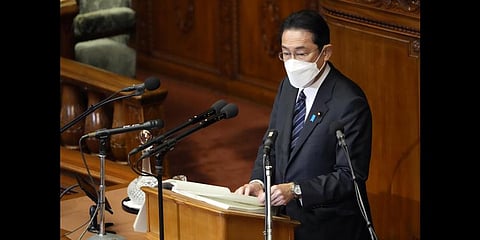

TOKYO: Japan's Prime Minister Fumio Kishida on Monday said fighting the pandemic was a “top priority” in his speech opening this year's parliamentary session, as the Tokyo region was hit by surging infections.
Kishida also named stepping up defence measures against rising regional threats as a priority, hours after North Korea test-fired two possible ballistic missiles, it's fourth this year.
“I will devote my body and soul to win this fight against the coronavirus,” Kishida said in his speech before the lower house, which marked the start of its new 150-day session. He called on people to help each other to overcome “the national crisis" of the pandemic.
The Japanese capital reported 4,172 new cases on Sunday, raising the hospital bed occupancy rate to 19.3 per cent. Tokyo authorities have said that when that rate breaches 20 per cent, they will request the government place the area under pre-emergency status and move toward restrictions like working from home and shorter hours for eateries.
Kishida reiterated his plans to keep Japan's stringent border controls in place, banning most foreign entrants until the end of February, while the country tries to speed up booster shots of COVID-19 vaccines and reinforce medical systems to support an increasing number of patients being treated at home.
The highly transmissible omicron variant has driven infections higher and started to paralyze medical and public services in some areas, as more people are forced to self-isolate. Japan last week trimmed the 14-day quarantine period to 10 days.
Kishida urged companies to promote remote work and called on schools to use online classes flexibly. Booster shots only started last month with medical workers and so far less than 1 per cent of the population has had their third jab.
Japan recently cut the wait between a second and third shot for elderly people to six months from eight. In part because of a shortage of imported vaccines, most younger Japanese are not expected to get their turn until March.
In his parliamentary speech, Kishida also addressed what he said was an “increasingly severe and complex" regional situation. “I'm determined to protect the people's lives and daily life," the premier vowed.
North Korea's repeated and escalating test-firing of ballistic missiles “are absolutely not permissible and we should not overlook its significant progress of missile technology," Kishida added.
North Korea on Monday fired two possible ballistic missiles, which Japanese officials said landed off the North's eastern coast.
North Korea's nuclear and missile development, along with China's rapid military buildup, have already prompted Kishida's government to raise Japan's military budget.
Kishida repeated his plans to review Japan's defence policy, and consider the development of a controversial pre-emptive strike capability, to “drastically strengthen defence power”.
Kishida is set to hold an online summit with President Joe Biden on Jan. 21 as the two leaders seek to further strengthen bilateral ties, Tokyo and Washington announced Monday.
Kishida called the U.S. alliance “the lynchpin of Japan's diplomatic and security policies."
Kishida, who is from the city of Hiroshima that the U.S. attacked with an atomic bomb in World War Two, also said he sought "a world without nuclear weapons" and plans to launch a conference with former and serving world leaders on phasing out nuclear weapons. He said he hoped the initiative would have its first meeting in his hometown this year.
Kishida pledged to promote energy reforms to meet the target of reaching carbon neutrality by 2050. He said he supported the use of “innovative” nuclear energy, nuclear fusion technology as well as renewables to meet this goal.